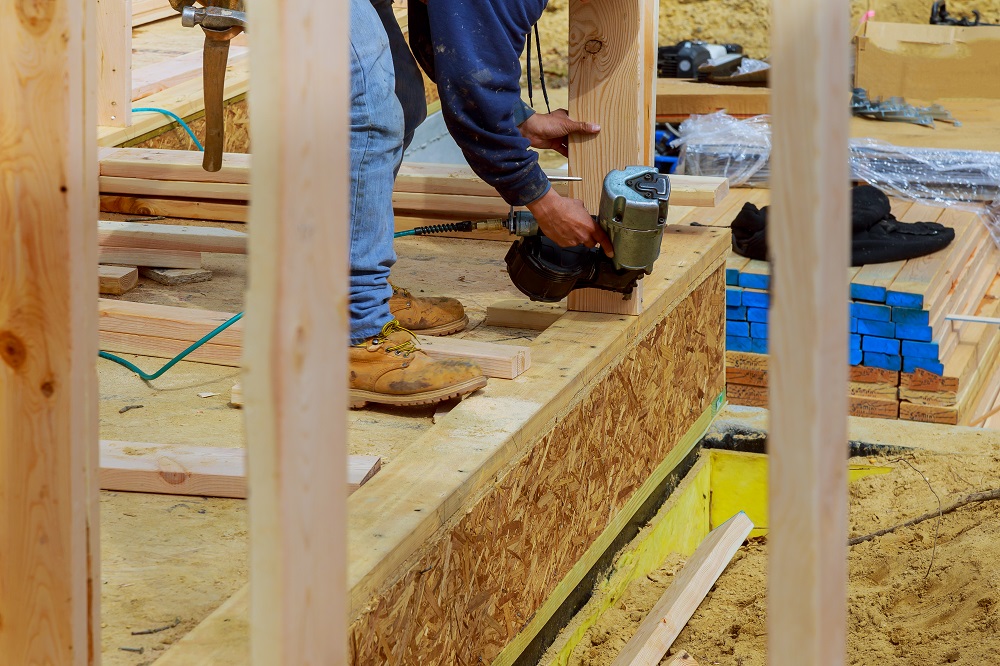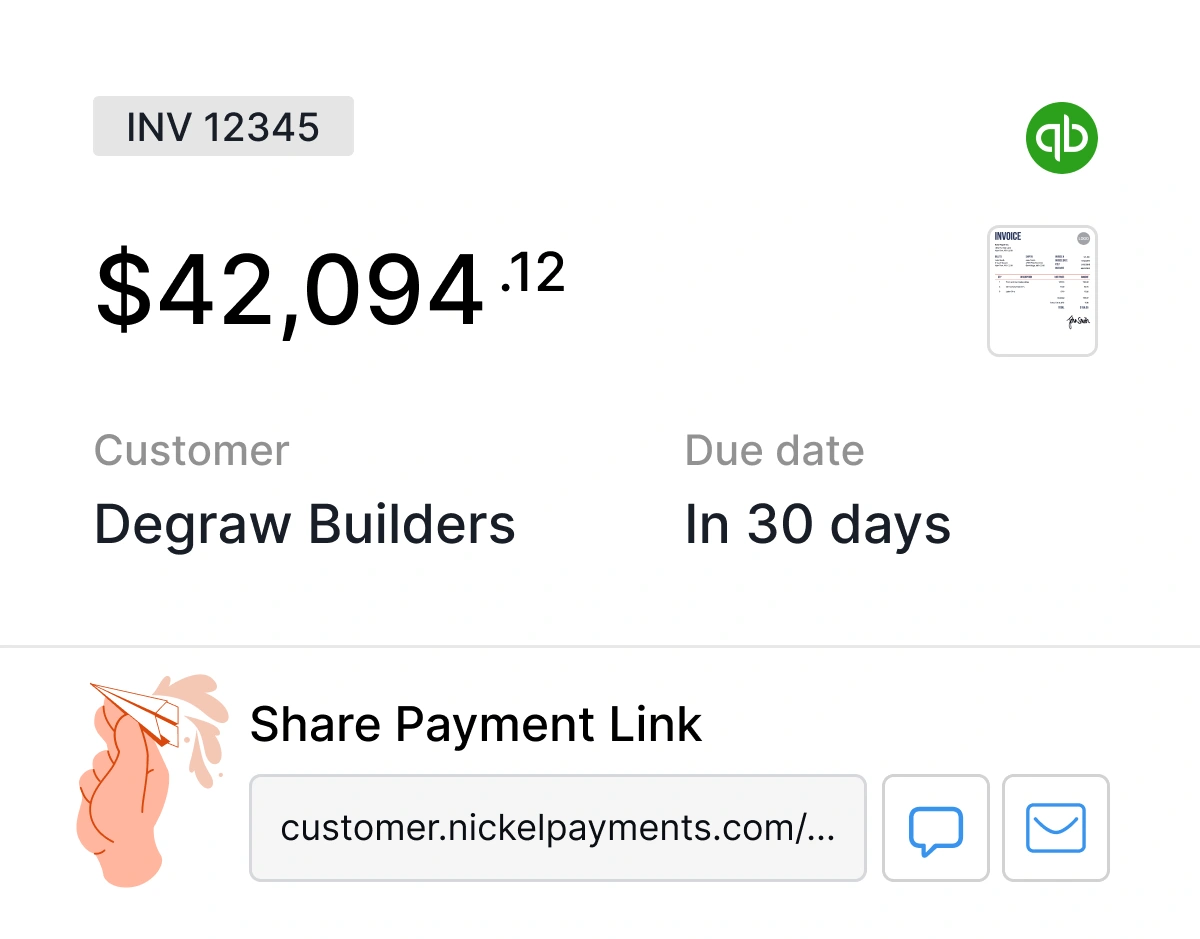Framing Invoices & Payments Built for Framers
Frame your success with payments that actually work for framing contractors

Trusted by 10,000+ industrial small businesses














































Why Framers Are Switching to Nickel
Unlike traditional payment processors that treat you like a "high-risk" business, Nickel was built specifically for trade professionals who handle large invoice-based transactions. We understand that:
- $25,000 custom home frame jobs are normal business, not suspicious activity
- Seasonal construction surges create payment spikes that banks often flag as unusual
- You need reliable processing during peak building seasons like spring and summer
- Your cash flow depends on predictable payment timing, not arbitrary holds
Result: No surprise account holds, no "business verification" delays, no risk department calls.

Why Framers Are Switching to Nickel
Unlike traditional payment processors that treat you like a "high-risk" business, Nickel was built specifically for trade professionals who handle large invoice-based transactions. We understand that:
- $25,000 custom home frame jobs are normal business, not suspicious activity
- Seasonal construction surges create payment spikes that banks often flag as unusual
- You need reliable processing during peak building seasons like spring and summer
- Your cash flow depends on predictable payment timing, not arbitrary holds
Result: No surprise account holds, no "business verification" delays, no risk department calls.
Before Nickel vs. After Nickel
Multiple systems for invoicing, payments, and bookkeeping
Banks freeze accounts over routine $15,000 frame jobs
Lose 1-3% on every transaction ($150-450 per typical project)
Banks don't understand framing business patterns
Hours spent matching payments to invoices in QuickBooks
Everything integrated: invoicing, payments, and QuickBooks sync
We understand large and variable transactions are normal for framers and our support team is highly responsive if you ever run into issues
Keep 100% of what customers pay you
Designed around how your business actually works
Your invoices and payments automatically sync to the right customer, project, and job, plus seamless AP integration
The Modern Framing Payment Challenge
The framing industry faces unique financial pressures that generic payment processors simply don't understand. With 91,893 framing businesses competing nationwide and the industry generating $31.5 billion annually, framers are caught between rising material costs and payment delays that threaten cash flow.
Project Payment Volatility:
Framing work involves significant upfront material costs before payment collection. A typical residential frame requires thousands of dollars in lumber, hardware, and labor that must be financed until the general contractor or homeowner pays - often 30-90 days later. When 90% of framing contracts follow a "90% at substantial completion, 10% after punch list" structure, framers essentially become short-term lenders to their customers.
Seasonal Cash Flow Swings:
Framing contractors experience extreme seasonal variation, with spring and summer bringing 70% of annual revenue in many markets. Traditional banks see these cyclical payment surges as red flags, leading to account freezes precisely when framers need cash flow most to cover payroll and material costs during peak season.
Material Cost Pressure:
The framing industry faces ongoing material price volatility, with lumber costs fluctuating dramatically based on market conditions. When a typical frame job requires $8,000-15,000 in materials before any payment is received, framers need reliable payment processing to maintain positive cash flow. The combination of rising material costs and delayed payment structures creates a cash crunch that many traditional processors don't understand.
Subcontractor Payment Complexity:
Most framing projects involve coordinating with multiple subcontractors for concrete, electrical rough-in, and plumbing. Managing these payment schedules while waiting for your own collections creates a complex financial juggling act that requires predictable payment processing without surprise holds or delays.

The Modern Framing Payment Challenge
The framing industry faces unique financial pressures that generic payment processors simply don't understand. With 91,893 framing businesses competing nationwide and the industry generating $31.5 billion annually, framers are caught between rising material costs and payment delays that threaten cash flow.
Project Payment Volatility:
Framing work involves significant upfront material costs before payment collection. A typical residential frame requires thousands of dollars in lumber, hardware, and labor that must be financed until the general contractor or homeowner pays - often 30-90 days later. When 90% of framing contracts follow a "90% at substantial completion, 10% after punch list" structure, framers essentially become short-term lenders to their customers.
Seasonal Cash Flow Swings:
Framing contractors experience extreme seasonal variation, with spring and summer bringing 70% of annual revenue in many markets. Traditional banks see these cyclical payment surges as red flags, leading to account freezes precisely when framers need cash flow most to cover payroll and material costs during peak season.
Material Cost Pressure:
The framing industry faces ongoing material price volatility, with lumber costs fluctuating dramatically based on market conditions. When a typical frame job requires $8,000-15,000 in materials before any payment is received, framers need reliable payment processing to maintain positive cash flow. The combination of rising material costs and delayed payment structures creates a cash crunch that many traditional processors don't understand.
Subcontractor Payment Complexity:
Most framing projects involve coordinating with multiple subcontractors for concrete, electrical rough-in, and plumbing. Managing these payment schedules while waiting for your own collections creates a complex financial juggling act that requires predictable payment processing without surprise holds or delays.
Simplified Modern Workflow
Send invoice (or use your existing invoicing)
Customer pays instantly via secure link
Payment auto-syncs to QuickBooks
Money hits your account in 2 business days
Built-in QuickBooks Integration
Your payments automatically sync to the right invoice, customer, and job. No more:


Compare: Nickel vs. Other Payment Platforms
What This Means for Your Framing Business
Save Money
Zero ACH fees: Save $4,000-12,000 per year on a typical framing business No hidden costs: No setup fees, monthly fees, or surprise charges Early payment discounts: Pay and get paid faster, capture supplier discounts
Save Time
Automated reconciliation: 3+ hours per week saved on bookkeeping Instant invoicing: Send payment links directly from job sites One system: Stop switching between payment apps, banking apps, and QuickBooks
Reduce Risk
Process large payments worry-free: We understand framing transactions and provide responsive support when needed Predictable processing: Money hits your account in 2 business days Secure payments: Bank-level security without the bank headaches
Framing Industry Payment Breakdown
The $31.5 billion U.S. framing industry faces unique financial pressures that traditional payment processors weren't designed to handle. Understanding these challenges helps explain why framers need specialized payment solutions.
Industry Fragmentation:
With 12,500 framing contractors operating nationwide, 70% generate less than $500,000 annually. These smaller operations lack the leverage to negotiate better payment terms with banks or processors, often getting stuck with high fees and restrictive policies designed for larger enterprises that don't understand construction cash flow patterns.
Project Economics:
The average framing contractor employs 7 workers and generates $2.1 million annually, with individual projects ranging from $5,000 for small additions to $50,000+ for custom homes. When customers pay by credit card, processors typically charge 2.9-3.5% plus transaction fees, eating directly into margins that are already compressed by rising labor and material costs.
Labor Cost Pressures:
Experienced journeyman framers earn approximately $52,000+ annually, with foremen earning $85,000+. These competitive wages are necessary to attract skilled workers to physically demanding work, but they create significant payroll obligations that require predictable cash flow. When customer payments are delayed or held by processors, meeting weekly payroll becomes a constant stress point.
Construction Cycle Dependencies:
Framing represents 16.6% of total construction costs and occurs early in the building process, making framers particularly vulnerable to payment delays from general contractors and homeowners. Unlike finishing trades that work near project completion, framers must often wait months for final payment while continuing to finance materials and labor for subsequent projects.

Framing Industry Payment Breakdown
The $31.5 billion U.S. framing industry faces unique financial pressures that traditional payment processors weren't designed to handle. Understanding these challenges helps explain why framers need specialized payment solutions.
Industry Fragmentation:
With 12,500 framing contractors operating nationwide, 70% generate less than $500,000 annually. These smaller operations lack the leverage to negotiate better payment terms with banks or processors, often getting stuck with high fees and restrictive policies designed for larger enterprises that don't understand construction cash flow patterns.
Project Economics:
The average framing contractor employs 7 workers and generates $2.1 million annually, with individual projects ranging from $5,000 for small additions to $50,000+ for custom homes. When customers pay by credit card, processors typically charge 2.9-3.5% plus transaction fees, eating directly into margins that are already compressed by rising labor and material costs.
Labor Cost Pressures:
Experienced journeyman framers earn approximately $52,000+ annually, with foremen earning $85,000+. These competitive wages are necessary to attract skilled workers to physically demanding work, but they create significant payroll obligations that require predictable cash flow. When customer payments are delayed or held by processors, meeting weekly payroll becomes a constant stress point.
Construction Cycle Dependencies:
Framing represents 16.6% of total construction costs and occurs early in the building process, making framers particularly vulnerable to payment delays from general contractors and homeowners. Unlike finishing trades that work near project completion, framers must often wait months for final payment while continuing to finance materials and labor for subsequent projects.
Ranked #1 Easiest to Use Payment Solution by G2
See why Nickel outranks every major competitor, including Forwardly, Melio, and Square
Get Started in Minutes
No contracts. No setup fees. No risk.
Sign Up (2 minutes)
Connect QuickBooks (1 click)
Start Getting Paid (immediately)

Ready to Fix Your Payment Problems?
Stop losing money to fees and time to complicated workflows. Join thousands of contractors who've already made the switch.








